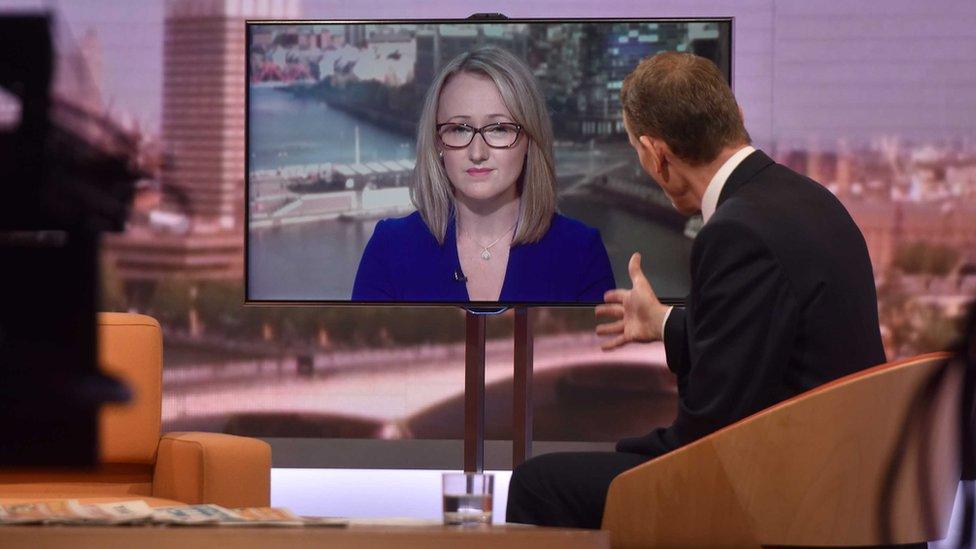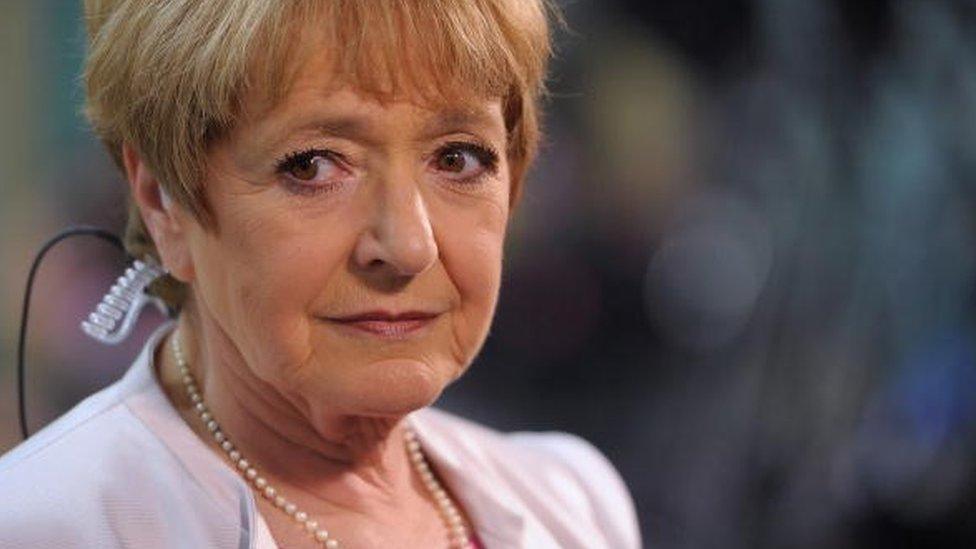Anti-Semitism row: Labour will 'get it right' says Rebecca Long-Bailey
- Published

Rebecca Long-Bailey said the Labour code had not "won the faith of the Jewish community"
Labour will get its new code of conduct on anti-Semitism "right" and restore faith among the Jewish community, a shadow cabinet minister has said.
Rebecca Long-Bailey said the party had been in a "very dark place" because of "the actions of a minority... and the failure of us to deal with it quickly".
Labour's new guidelines were criticised by some Jewish leaders and some MPs.
One MP, Margaret Hodge faces "action" after reportedly swearing at Jeremy Corbyn over the issue last week.
Labour's code of conduct was rubber-stamped by its executive committee on Tuesday.
It says: "Anti-Semitism is racism. It is unacceptable in our party and in wider society."
But it does not include all of the "working examples" given in the International Holocaust Remembrance Alliance's (IHRA) definition of anti-Semitism, external.
Following criticism, Labour said it would "reopen development of the code" in consultation with Jewish groups.
Ms Long-Bailey said the code had been intended to reaffirm Labour's commitment to the the IHRA definition and "adopt and expand" upon the examples.
She told BBC One's Andrew Marr Show: "We wanted to develop a code that was legally robust and detailed so that we could enforce it quickly in our disciplinary processes.
"But we haven't won the faith of the Jewish community, and indeed my own parliamentary colleagues have expressed concern.
"The intention was never to omit parts of the IHRA definition."
She added: "We recognise the concerns and that's why this week it was right for the NEC to look at the code again and look at consulting with the Jewish community to make sure we get it right, because we have to restore faith in the Jewish community."

Dame Margaret Hodge has been a fierce critic of Labour's new anti-Semitism guidelines
Senior Jewish Labour MP Dame Margaret, who lost family members in the Holocaust, last week confronted Labour leader Jeremy Corbyn in Parliament over the party's response to anti-Semitism.
She later said Mr Corbyn was "now perceived by many as an anti-Semite" and faces action under Parliamentary Labour Party procedures requiring MPs to behave in a "respectful" way towards colleagues.
Ms Hodge has said she chose to "confront" Mr Corbyn to express her "outrage".
Mr Corbyn said on Sunday he had "felt upset about it but as always I am very calm and treat people with a great deal of respect".

Jeremy Corbyn says there will be further consultation on the code
He said there would be further consultation on the code before Labour "bring it back and get it right".
"I want us to deal with anti-Semitism in our society, as well as all of our parties, including my own.
He added: "What's been done is an honest attempt to make sure that we do make it clear we will not tolerate anti-Semitism in any form and we will allow legitimate debate on issues facing Israel and Palestine, but it cannot ever be conducted in any anti-Semitic form."
Labour's code of conduct was drawn up after the 2016 Chakrabarti inquiry. It followed allegations of anti-Semitism within party ranks.
The code does reproduce the IHRA's "working definition" of anti-Semitism and lists behaviours likely to be regarded as anti-Semitic - but critics point out that it leaves out four examples from that definition:
Accusing Jewish people of being more loyal to Israel than their home country
Claiming that Israel's existence as a state is a racist endeavour
Requiring higher standards of behaviour from Israel than other nations
Comparing contemporary Israeli policies to those of the Nazis
Labour's code says it is "wrong" to accuse Jewish citizens of being more loyal to Israel than their own country.
And it says that using Nazi comparisons in Israel-Palestine debates "carries a strong risk of being regarded as prejudicial or grossly detrimental to the party", triggering a disciplinary investigation.
Labour backbencher Stella Creasy, told BBC One's Sunday Politics that "many of us are absolutely despairing" that Labour had not yet resolved the anti-Semitism row.
"I don't think Jeremy Corbyn is an anti-Semite at all but I do think what's happening now requires his leadership," she said.
"It's really important that we tackle this, that we end this and the way we end this is by adopting those IHRA guidelines."
- Published18 July 2018
